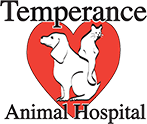Holiday Season Dangers
During the holiday season there are a lot of fun activities for family and pets. With these activities there are also some dangers that are often be overlooked. This is our list of some of the most common holiday dangers that cause your season to be not so merry.
1. The Christmas Tree
The Christmas tree itself is not toxic, but think of all of the items that you place on the tree. Tinsel, ornaments, candy canes, lights… These can be tempting for our little companions. While knocking them off of the tree can be annoying – chewing on them or eating them can be life threatening. The ornaments, tinsel, or cellophane wrap on candy canes can actually obstruct the intestinal tract causing vomiting, dehydration and could result in a serious surgical emergency.
Does your dog or cat like to chew on things? If your pet chews on the electrical cord from Christmas lights, it can result in burns, fires or even electrocution. As I write this, I am watching “National Lampoons Christmas Vacation”… The dog is choking on a bone and cat is chewing on the Christmas lights… That’s art imitating life for you! Please make sure you keep your pets from getting to the tree and lights when you are not there to supervise them. If you are not going to be home to watch them, it may be wise to put them in a room away from the tree or consider placing a baby gate around the tree.
2. Presents – Gift Wrap, Ribbon, Packaging
It’s the most wonderful time of the year! While you and your family are quickly unwrapping all of those gifts, it would be wise to gather up the trash at the same time. Any packaging has the potential to become a foreign body, and as we stated above this could cause anything from minimal vomiting to a major surgery.
3. Holiday Plants
Many of the decorative plants that we get around the holiday season although pretty, can cause some sort of issue in our pets.
– Holly can cause a number of gastrointestinal issues such as lip smacking, drooling, head shaking, vomiting, diarrhea and/or loss of appetite.
– Mistletoe can cause drooling, vomiting, diarrhea, abdominal pain, hypotension, ataxia, collapse, seizures and/or death.
– Poinsettias are actually safe, but keep in mind that the soil that they are typically packaged in contains fertilizer that can cause serious illness.
It is best to simply keep these and all household plants out of reach of your furry little loved ones. For a complete list of toxic plants and signs to look for please visit http://www.petpoisonhelpline.com/.
4. Food
Turkey, ham, pies, cookies, nuts, chocolates, etc… This is a great time of year to forget about the swimsuit and indulge on some great foods! But remember, there are a number of foods that can cause serious illness (such as nausea, vomiting, diarrhea, seizure and/or dehydration) or even death.
– Avocado
– Bread dough
– Chocolate
– Grapes and raisins
– Hops
– Macadamia nuts (most nuts should be avoided)
– Moldy or spoiled foods
– Onions
– Garlic
– Xylitol (artificial sweetener)
This list was taken from the ASPCA web site. More details can be found at http://www.aspca.org/pet-care/virtual-pet-behaviorist/dog-behavior/foods-are-hazardous-dogs. It would be best to keep your pets on their normal diet and ask your guest not to give anything from their plates (unless they want to help clean up the diarrhea later).
5. Stress
Keep in mind that this time of year can be particularly stressful for your companion. Typically the are dealing with new additions to their environment (Christmas tree, lights, plants, etc.) but also this is the season where you are either traveling to see loved ones or they are coming to see you. This can be a lot to deal with for your pet. Try to recognize if their abnormal behavior is a result of being nervous or stressed. An example of this is your cat not using the litter box, or your otherwise happy pup become more reclusive or even agitated. If you feel that your little one is not adapting well, give us a call and we will try to give you some tips and advice.
As always you are always welcome to call us if you have any questions
about this or any other animal health topic. Be safe and we wish you all a
wonderful holiday season and a joyous New Year!
